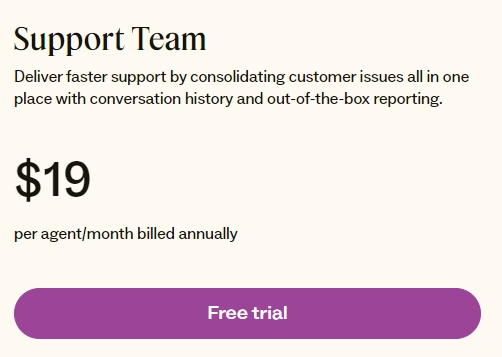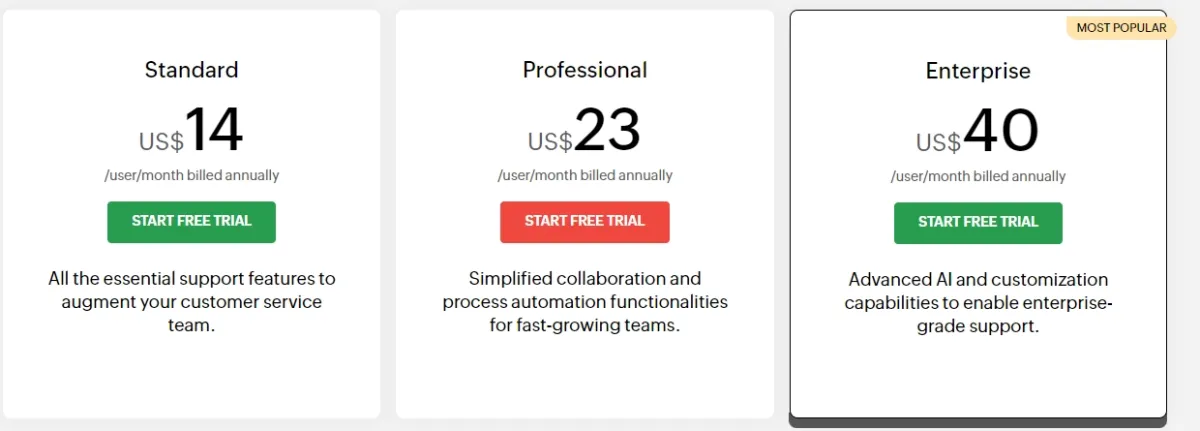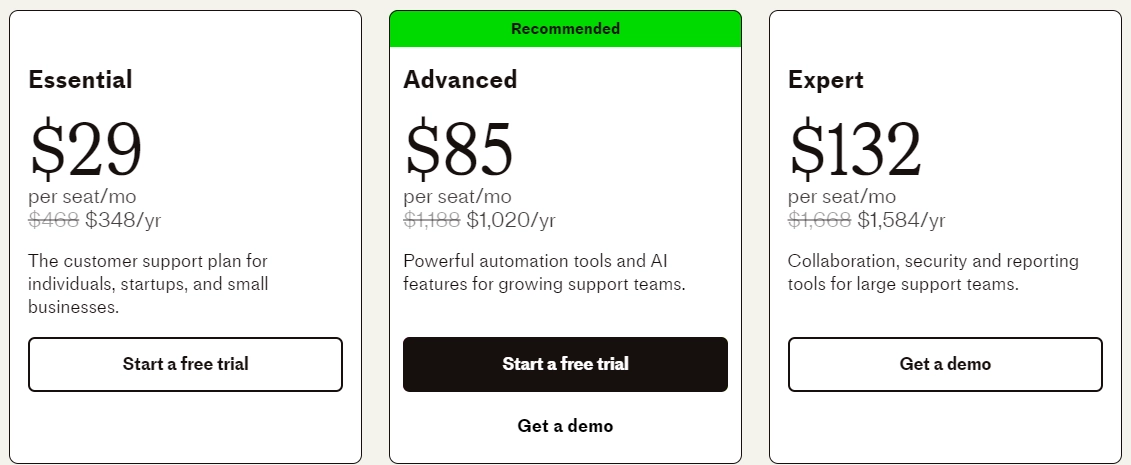- Freshdesk: Lowest cost starter plan for monthly subscription
- Zendesk Support Suite
- Salesforce Service Cloud
- Zoho Desk: Lowest cost starter plans for annual subscription
- Intercom: Lowest cost starter plan with AI agents
Help desk software pricing varies significantly depending on the number of users, included features, and contract length. See our help desk pricing comparison for a detailed breakdown:
Help desk pricing comparison
All prices are per agent/month, billed annually. Plan names have been normalized across vendors into Tier 1 (Starter), Tier 2 (Growth), Tier 3 (Pro), etc for easier comparison.
1. Freshdesk
Freshdesk offers 4 different plans and paid add-on tools:

Source: Freshworks1
Table 2: Freshdesk plans
| Billing type | Free | Growth | Pro | Enterprise |
|---|---|---|---|---|
| Annuall billing | – | $15 | $49 | $79 |
| Monthly billing | – | $18 | $59 | $95 |
Annual and monthly billing rows represent agent/month pricing.
- Growth: Basic support with essential ticketing and email features for SMEs.
- Pro: Greater customization and customer segmentation options for personalized support.
- Enterprise: Featured with bots and multi-channel support channels for enterprise-level support
Freshdesk add-ons
Freshbots by Freddy Self Service – $100 for 1000 Freshbots sessions: Engage with customers 24/7 using Freshbot sessions on email and voice; see FAQs channels.
Freddy Copilot – $29/agent/month, billed annually: Freddy Copilot can summarize issues, suggest next steps, and handle repetitive tasks.
Freshcaller – $15/agent/month (growth plan), billed annually: Freshcaller is a cloud-based phone system that makes calls over the Internet.2
For more, see our research about help desks:
2. Zendesk Support Suite
Zendesk Support Suite offers pricing plans under 2 categories:
2.1. All-in-one solutions

Source: Zendesk Support Suite3
Table 3: Zendesk Support Suite plans
| Billing type | Suite Team | Suite Growth | Suite Professional | Suite Enterprise |
|---|---|---|---|---|
| Annuall billing | $55 | $89 | $115 | $169 |
| Monthly billing | $69 | $115 | $149 | $219 |
Annual and monthly billing rows represent agent/month pricing.
- Suite team: Basic conversational service with quick setup for SMEs.
- Suite Growth: Increased self-service and automation capabilities at a scale.
- Suite Professional: Featured with collaboration tools, skill-based ticket routing, and analytics.
- Suite Enterprise: Personalized experience at scale with content suggestions and customizable roles and permissions.4
Table 4: Compare plans
| Features | Suite Team | Suite Growth | Suite Professional | Suite Enterprise |
|---|---|---|---|---|
| Multilingual content | 1 default language | 40+ languages | 40+ languages | 40+ languages |
| Multiple help centers | 1 | Up to 5 | Up to 5 | Up to 300 |
| AI agents resolutions per agent/month | 5 | 10 | 10 | 15 |
2.2. Build your own plan

Source: Zendesk5
Build your own plan starts from $19 per agent/month billed annually. This plan is suitable for small businesses that deal with a low number of tickets and that do not require analytics.
The plan includes the following default features with an option to add more features:
- Ticketing system
- Email, X, and Facebook messaging
- Customer details and conversation history
- AI agents
- Reporting and analytics
- Eligible for workforce management add-on
- Eligible for quality assurance add-on
Zendesk Support Suite add-ons:
Zendesk Workforce Management $25 per agent/month, billed annually: Workforce management (WFM) is a tool designed for enterprises with forecasting needs. WFM offers historical information on team performance and capacity. It offers:
- Forecasting
- Automatic agent scheduling
- Agent activity tracking
- Agent performance reporting
Zendesk Quality Assurance $35 per agent/month billed annually: Automatically evaluate all communications between human and AI agents, channels, and languages. It offers:
- Agent feedback
- Track performance trends
- QA for AI agents
Data Privacy and Protection $50 per agent/month billed annually: Support your compliance by adding an extra layer of protection and privacy. It offers:
3. Salesforce Service Cloud
Salesforce Service Cloud offers 5 different plans and paid add-on services:

Source: Salesforce6
Table 5: Salesforce Service Cloud plans
| Billing type | Starter Suite | Pro Suite | Enterprise | Unlimited | Einstein 1 Service |
|---|---|---|---|---|---|
| Annuall billing | $25 | $100 | $165 | $330 | $500 |
| Monthly billing | $25 | – | – | – | – |
The pricing structure is based on agent/month pricing.
- Starter Suite: The simplest CRM package for marketing, sales, support, and commerce.
- Pro Suite: The flexible CRM suite with additional marketing, sales, support, and commerce functions such as real-time chat and sales forecasting.
- Enterprise: More tailored plan with AI recommendations, and workflow automation.
- Unlimited: High-end plan for enterprises that need intelligent chatbots and 24-hour assistance.
Table 6: Compare plans
| Top features | Starter Suite | Pro Suite | Enterprise | Unlimited | Einstein 1 Service |
|---|---|---|---|---|---|
| Omni-channel routing | ❌ | ✅ | ✅ | ✅ | ✅ |
| Knowledge management | ✅ | ✅ | ❌ | ✅ | ✅ |
| Einstein for service | ❌ | ❌ | Available for purchase | Available for purchase | ✅ |
| Service intelligence | ❌ | ❌ | Available for purchase | Available for purchase | ✅ |
Salesforce Service Cloud add-ons
Einstein for Service from $75/user/month: Use conversational, predictive, and generative AI incorporated into the workflow to provide personalized assistance.
Visual Remote Assistant $50/user/month: Leverage real-time visual video service.
Service Intelligence from USD 220/user/month: Access AI-powered recommendations and insights.7
4. Zoho Desk
Zendesk Support Suite offers pricing plans under 2 categories:
4.1. All-in-one solutions
Freshdesk offers 3 different plans:

Source: Zoho Desk8
Table 7: Zoho Desk plans
| Standard | Professional | Enterprise | |
|---|---|---|---|
| Annuall billing | $14 | $23 | $40 |
| Monthly billing | $20 | $35 | $50 |
Annual and monthly billing rows represent agent/month pricing.
- Standard: Basic support features such as ticket management with limited automation for small-scale companies.
- Professional: Greater collaboration and process automation functionalities with custom reporting and access level controls for mid-sized fast-growing companies.
- Enterprise: AI agents and customization capabilities for enterprise-level assistance.
Table 8: Compare plans
| Top features | Standard | Professional | Enterprise |
|---|---|---|---|
| Custom reports | 50 | Unlimited | Unlimited |
| AI agent dashboards | ❌ | Limited | ✅ |
| Field-level access control | ❌ | ✅ | ✅ |
| Email channels | 5 | 10 | 100 |
| Live chat | ❌ | ✅ | ✅ |
| Ticket tags | 20 | 30 | 50 |
| Macros | 5 | 15 | 30 |
2.2. Express plan

Source: Zoho Desk9
Zoho Desktop Express is a simple service provider for individuals and small teams with basic ticketing, social media, and analytics features. The plan starts from $7/user/month billed annually.
5. Intercom
Intercom offers 3 different pricing plans and paid add-on services with Fin AI agent available in all plans starting from $0.99 per resolution:

Source: Intercom10
Table 9: Intercom plans
| Essential | Advanced | Expert |
|---|---|---|
| $29 | $85 | $132 |
The pricing structure is based on agent/month pricing, billed monthly.
- Essential: Basic plan for individuals, startups, and small businesses.
- Advanced: Extended plan with automation tools and AI agents for growing technical support teams.
- Expert: Comprehensive plan for team collaboration, enterprise-level security.
Table 10: Compare plans
| Top features | Essential | Advanced | Expert |
|---|---|---|---|
| Workflows automations | ❌ | ❌ | ✅ |
| Custom reports | ❌ | ✅ | ✅ |
| AI compose | ✅ | ✅ | ✅ |
| AI summarize | ❌ | ✅ | ✅ |
| AI autofill | ❌ | ✅ | ✅ |
| Seats for back-office teams | ❌ | 20 | 50 |
Key factors that influence help desk pricing
Number of agents
- The pricing model often scales with the number of users or agents who will be using the software. More users generally mean higher costs.
Features
- Additional features: AI agents, skill-based routing, custom reporting, and analytics, can increase the price.
- Basic packages commonly include essential ticketing and outsourced support for emails, while premium packages offer more comprehensive tools.
Deployment type
- Cloud-based (SaaS) solutions typically have subscription-based models, which might be monthly or annually.
- On-premises solutions may involve a one-time license fee along with ongoing maintenance costs.
Customization
- Solutions that offer higher levels of customization and can scale according to business growth often come at a premium.
- The ability to tailor workflows, add custom fields, and create personalized user interfaces can affect the price.
Customer support
- The level of customer support (e.g., 24/7 support, dedicated account managers) and training provided (e.g., onboarding, user training, and documentation) can influence the cost.
- Service providers may charge extra for extensive support and training packages.
Integration capabilities
- Software that can offer a large number of integrations with CRM, ERP, and other third-party applications) may be priced higher due to the added value and convenience.
Security and compliance
- Additional security features (e.g., encryption, single sign-on, compliance with standards like GDPR, and HIPAA) can increase costs.
Contract length and payment terms
- Discounts might be available for annual contract terms.
- Additional services, such as add-on tools in the package, can increase costs.
Vendor selection criteria
- Number of B2B reviews: 4,000+ reviews on G2, TrustRadius, and Capterra software review sites.
- Average rating: Above 4.0/5 on G2, TrustRadius, and Capterra software review sites.
- Employee size: 1,000+ employees on Linkedin.
- Sorting: With sponsored vendors at the top, others are sorted by total number of reviews in descending order.
Further reading
External Links
- 1. Freshdesk Pricing & Plans | Freshworks.
- 2. Freshdesk Pricing & Plans | Freshworks.
- 3. Zendesk Pricing | Plans starting from just $55/month.
- 4. Zendesk Pricing | Plans starting from just $55/month.
- 5. Zendesk Support Pricing | Plans starting from just $19 an agent.
- 6. Service & Field Service Customer Service Software Pricing | Salesforce US.
- 7. Service & Field Service Customer Service Software Pricing | Salesforce US.
- 8. Zoho Desk – Preise und Editionen | Flexible kostenlose Testversion.
- 9. Zoho Desk – Preise und Editionen | Flexible kostenlose Testversion.
- 10. Get AI-powered customer service from US$29/mo.


Comments
Your email address will not be published. All fields are required.